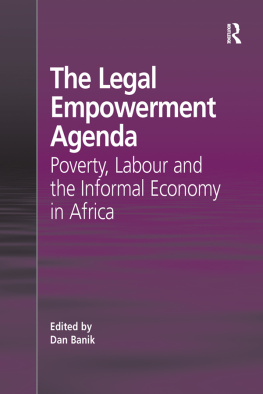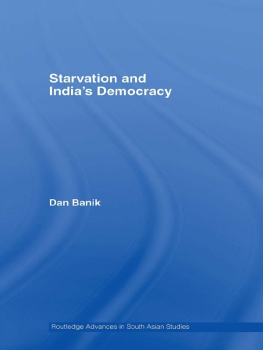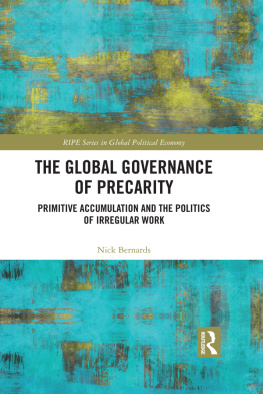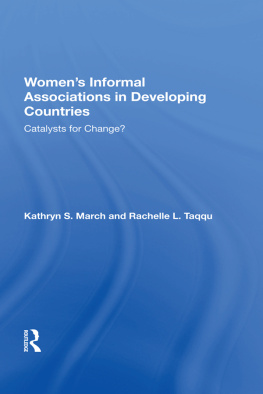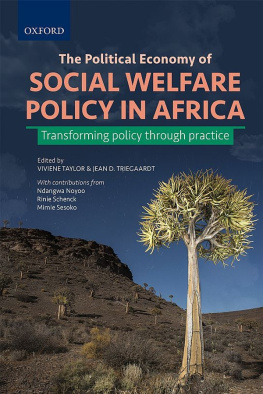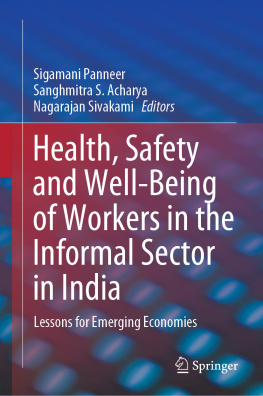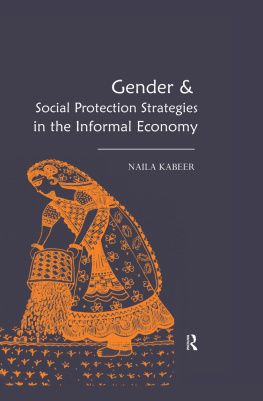First published 2011 by Ashgate Publishing
Published 2016 by Routledge
2 Park Square, Milton Park, Abingdon, Oxon OX14 4RN
711 Third Avenue, New York, NY 10017, USA
Routledge is an imprint of the Taylor & Francis Group, an informa business
Copyright 2011 Dan Banik
Dan Banik has asserted his right under the Copyright, Designs and Patents Act, 1988, to be identified as the editor of this work.
All rights reserved. No part of this book may be reprinted or reproduced or utilised in any form or by any electronic, mechanical, or other means, now known or hereafter invented, including photocopying and recording, or in any information storage or retrieval s ystem, without permission in writing from the publishers.
Notice:
Product or corporate names may be trademarks or registered trademarks, and are used only for identification and explanation without intent to infringe.
British Library Cataloguing in Publication Data
The legal empowerment agenda: poverty, labour and the
informal economy in Africa.
1. Public welfare--Law and legislation--Africa.
2. Informal sector (Economics)--Law and legislation-
Africa. 3. Labour laws and legislation--Africa. 4. Equality
before the law--Africa.
I. Banik, Dan, 1969
344.60325-dc22
Library of Congress Cataloging-in-Publication Data
The legal empowerment agenda : poverty, labour and the informal economy in Africa /
[edited and co-authored] by Dan Banik.
p. cm.
Includes index.
ISBN 978-1-4094-1118-5 (hbk) -- ISBN 978-1-4094-1119-2 (pbk)
1. Informal sector (Economics)--Law and legislation--Africa, Sub-Saharan.
I. Banik, Dan, 1969
KQC764.L44 2011
330--dc22
2010050745
ISBN 9781409411185 (hbk)
ISBN 9781409411192 (pbk)
Pamhidzai H. Bamu is a researcher and doctoral candidate at the Institute of Development and Labour Law at the University of Cape Town. She completed her LLB in 2004 and then received her LLM in labour law at the University of Cape Town in 2006. pamhidzai has worked as a researcher on various labour and development issues. Her research interests include the changing world of work, the impact of globalisation on labour regulation, labour migration, social security in developing labour markets, the promotion of decent work, and labour markets and their regulation in the SADC region.
Dan Banik is an Associate professor and research Director at the Centre for Development and environment (Sum), University of oslo. Dans research interests include development theory, democracy, inequality, human rights, legal empowerment of the poor, policy studies and implementation, development ethics, undernutrition and famine, civil service reform and media in developing countries. In addition to directing the research programme poverty and Development in the 21st Century at SUM, he heads the reference Group of the Norwegian-Finnish Trust Fund in the World Bank for environmentally and Socially Sustainable Development (TFESSD). His recent books include Rights and Legal Empowerment in Eradicating Poverty (Ashgate 2008) and Poverty and Elusive Development (Scandinavian University press 2010).
Blessings Chinsinga holds an Mphil from the University of Cambridge, UK and a phD from the University of Mainz, Germany. He is based at the Department of political and Administrative Studies, Chancellor College, University of Malawi as an Associate professor and the Deputy Dean of Social Science. Blessings specialises in institutions, governance and development, public policy analysis, rural livelihood, democracy and decentralisation and local level politics. He coordinated an MA programme in Development Studies between 2006 and 2008 and currently coordinates a five-year collaborative project on democracy consolidation between the Department of political and Administrative Studies, University of Malawi and the Department of Comparative politics, University of Bergen, Norway.
Kanakulya Dickson is a lecturer of philosophy at Makerere University and the Uganda Christian University. He has a Masters degree from the University of Bergen and is currently a doctoral candidate at Makerere. Kanakulyas research interests include ethics and morality, philosophy of medicine, human rights and empowerment, development and politics and cultural philosophy. He has been engaged in various collaborative research projects, written and presented papers at various international forums and published a number of peer reviewed articles. His latest work (co-authored with paola de Cuzzani), Making Bioethics Global: Ethical Challenges in Indigenous Medicine (Verlag dr. Muller publishers, 2010), investigates the moral issues in the indigenous medical research industry. Kanakulya is a member of the Makerere Centre for applied ethics (MACAE) and the academic network on the Legal empowerment of the poor (ANLEp).
Ellen Hillbom is an assistant professor at the department of economic History, Lund University, Sweden. Her primary field of research is agricultural development and transformation in sub-Saharan africa. within this broader field, she has studied property rights, access and allocation of water resources, intensification of farming methods, market expansion and rural-urban linkages. In connection to her interests in the agricultural transformation, ellen has also written on processes of structural transformation and its importance for sustainable national economic development. within the region, she has studied Botswana and Tanzania, but has also written generally on the economic history of sub-Saharan africa.
Ngeyi Ruth Kanyongolo is a lecturer in the Faculty of Law and head of the practical Legal Studies department at Chancellor College, University of Malawi. She has an LLB (Hons) (Malawi), LLM (London) and phO (warwick) and specialises in issues related to labour, social security, and women and law. Ngeyi is a visiting lecturer at the University of Zimbabwes LLM programme on womens law and is currently the president of the Women Lawyers association. She has previously served as Vice president of the Malawi Law Society. Her recent and forthcoming publications are on social security, labour and trade unions in Malawi, teaching methods in women and law and women and customary law in Malawi.
Evance Kalula is professor of Law (employment law and social security), director of the Institute of development and Labour Law and deputy dean for Internationalisation and Outreach in the Faculty of Law, University of Cape Town. He chairs the South Mrican employment Conditions Commission, a statutory body responsible for setting sectoral conditions of employment and wages. He is also a member of the Ministerial advisory panel of the department of economic development, South Mrica and president-elect of the International Labour and employment Relations association (ILERA). His research and teaching interests are mainly in international and comparative labour law, labour market regulation and social security. He specialises in the jurisdictions of the Southern African development Community (SADC) countries.

